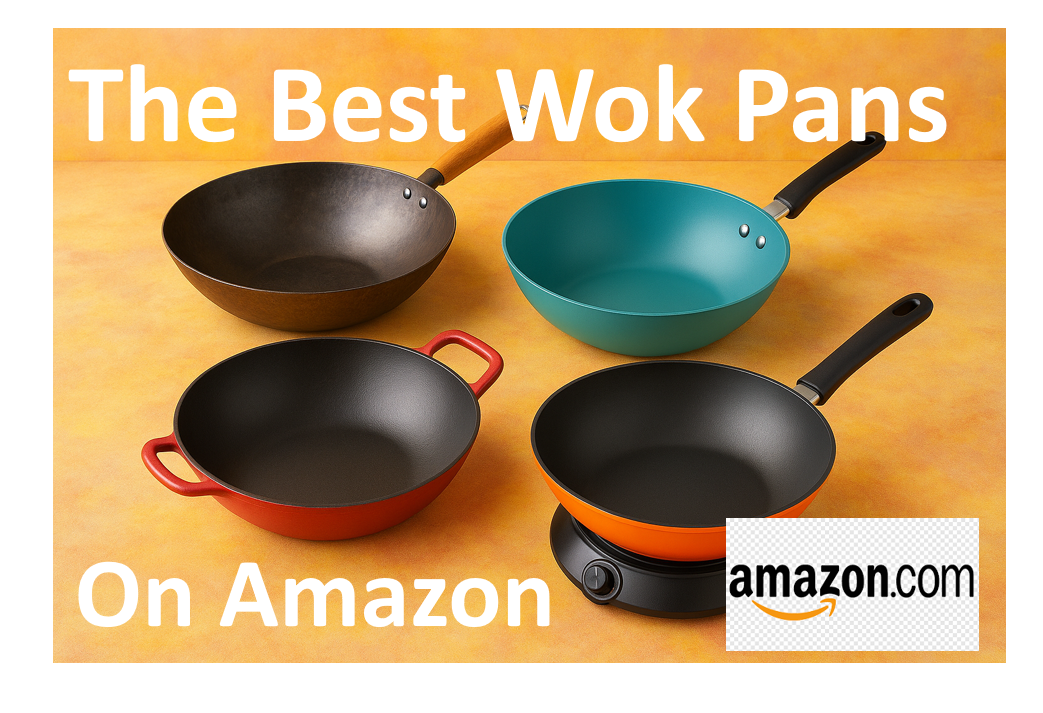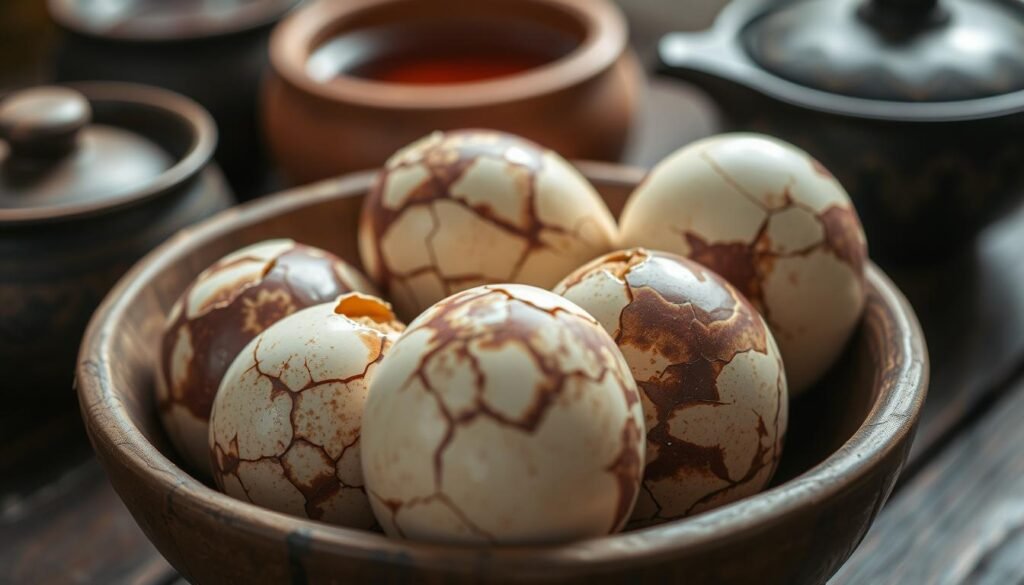
Welcome to the world of chinese tea eggs. This traditional snack mixes eggs with tea for a tasty treat. You’ll learn how to make these marbled eggs at home, also known as soy sauce eggs.
This guide will show you the cultural importance of chinese tea eggs in traditional chinese cuisine. You’ll get a simple recipe to make them. Whether you love traditional chinese food or want to try something new, this guide is for you.
Here is a table of quantity of ingredients:
| Ingredients | Quantity |
|---|---|
| Eggs | 6 |
| Tea | 1 cup |
| Soy sauce | 1/2 cup |
You’ll get a detailed recipe for delicious chinese tea eggs. These marbled eggs are a favorite in traditional chinese cuisine. You’ll also learn how to make perfect soy sauce eggs at home.
The Cultural Significance of Chinese Tea Eggs
Chinese tea eggs are a big deal in traditional Chinese cuisine. They’re not just tasty; they also carry deep symbolic meaning. These eggs are a hit at weddings and holidays, believed to bring luck and wealth.
Chinese tea eggs stand out among Asian eggs for their unique taste and smell. They’re made by soaking eggs in a mix of tea, spices, and more. To learn how to make them, check out traditional Chinese cuisine websites.
To grasp the cultural importance of Chinese tea eggs, we must look at their history and how they’re served. Here are some key points:
- Origins: Chinese tea eggs have a long history, being a key part of traditional Chinese cuisine.
- Traditional serving occasions: They’re served at special events like weddings and holidays, believed to bring luck and wealth.
- Symbolic meaning: Chinese tea eggs symbolize good luck and prosperity, often given as gifts at special times.
Understanding the cultural significance of Chinese tea eggs helps us appreciate their creation. Whether you try them at a Chinese restaurant or make them at home, you’ll enjoy their unique flavor and aroma.
What Makes Chinese Tea Eggs Special
Exploring asian cuisine reveals the delight of tea-infused eggs. These eggs are special because of the cooking with tea process. It adds a unique flavor and aroma, unlike regular hard-boiled eggs. The mix of the egg’s richness and the tea’s depth makes them a standout dish.
The infusion of tea is key to Chinese tea eggs’ uniqueness. It gives them a savory and slightly sweet taste. This step makes them different from other eggs. Some benefits of tea-infused eggs include:
- Unique flavor and aroma
- Rich in antioxidants from the tea
- Can be served as a snack or appetizer in asian cuisine
Choosing the right tea is crucial when cooking with tea. Black, green, and oolong teas are commonly used. Each tea type adds a distinct flavor and aroma to the eggs. This makes them a great addition to any asian cuisine dish.
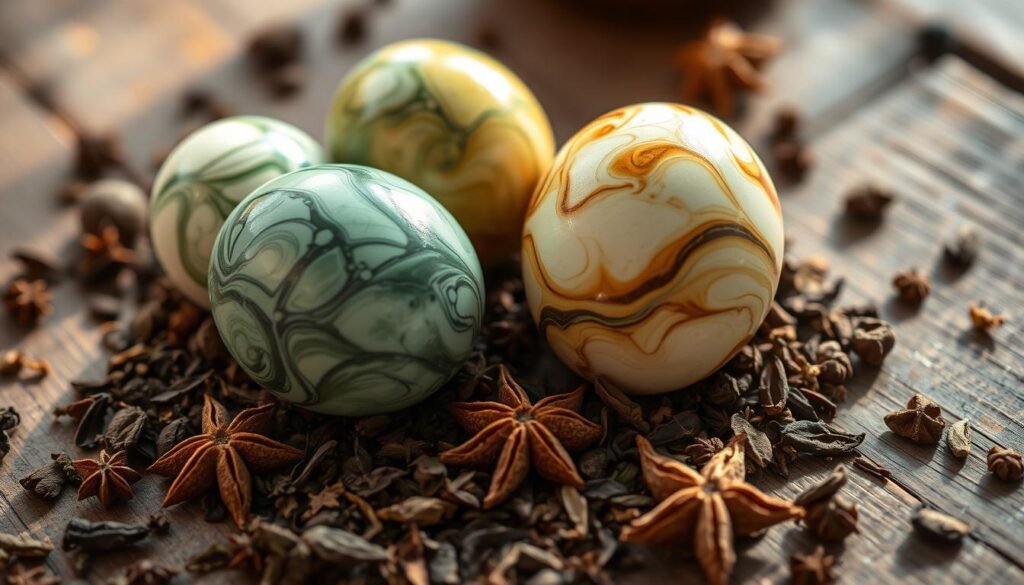
In summary, Chinese tea eggs are a special treat in asian cuisine. They offer a unique taste and aroma thanks to the tea infusion. If you’re looking to try something new or want to enhance your cooking with tea, Chinese tea eggs are a must-try.
Essential Ingredients for Perfect Tea Eggs
To make perfect Chinese tea eggs, you need the right tea egg ingredients. Choose a high-quality tea to infuse the eggs with flavor and aroma. Also, the right spices and seasonings are key for a traditional chinese recipe.
The flavor of savory tea eggs depends on the tea and spices. Here are the essential ingredients you’ll need:
- Black tea or a mix of black and green tea
- Soy sauce
- Five-spice powder
- Star anise
- Cinnamon sticks
- Eggs
The amount of each ingredient can vary based on your taste. Here’s a general guide:
| Ingredient | Quantity |
|---|---|
| Black tea | 2 tablespoons |
| Soy sauce | 1/4 cup |
| Five-spice powder | 1 teaspoon |
| Star anise | 2 whole |
| Cinnamon sticks | 2 |
| Eggs | 6-8 |
Required Kitchen Equipment
To make your homemade chinese tea eggs, you need basic kitchen tools. You probably already have them. The tools for chinese cooking and tea egg recipe are simple and common.
Here’s a list of what you need:
- A large pot for boiling the eggs
- A container for steeping the eggs in tea
- A strainer or slotted spoon for removing the eggs from the pot
- A plate or tray for cooling the eggs
These tools make making homemade chinese tea eggs easier. You can then perfect your tea egg recipe and enjoy your chinese cooking success.
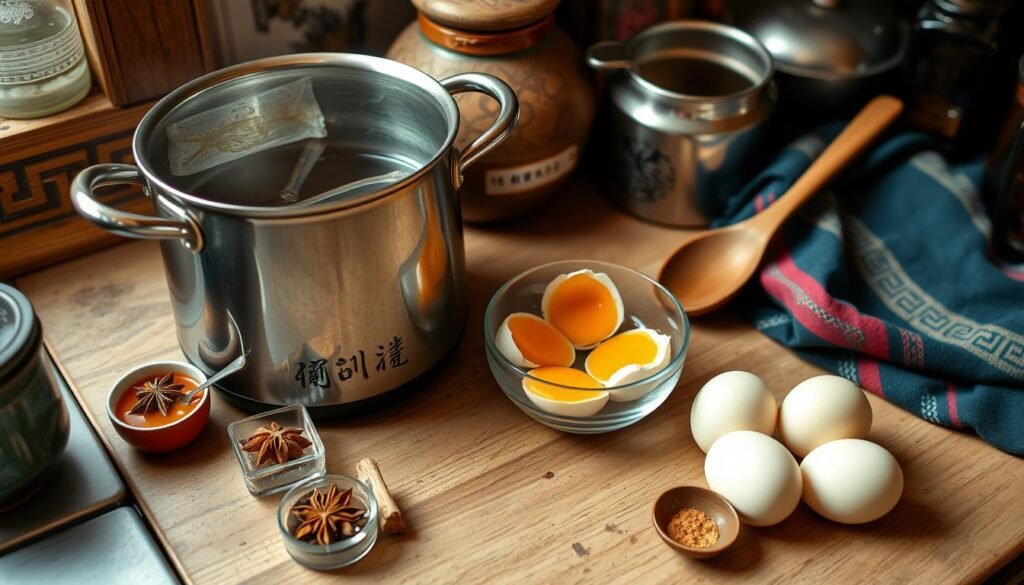
With these simple tools, you’re ready to make delicious homemade chinese tea eggs. Always use fresh, high-quality ingredients for the best tea egg recipe.
Step-by-Step Chinese Tea Eggs Recipe
To make delicious chinese tea eggs, follow a few key steps. You’ll boil, crack, and steep eggs in a tea mix. This traditional recipe lets you enjoy the unique flavors and textures of chinese tea eggs.
Start by boiling the eggs. This step cooks them and gets them ready for the next steps. Then, create the perfect crack pattern on the eggs. This lets the tea get inside, giving them their special flavor and look.
Tea Marinade Ingredients
The tea marinade is key in the chinese tea eggs recipe. You’ll need:
- 1 cup of strong brewed tea
- 1/2 cup of soy sauce
- 1/4 cup of sugar
- 2 tablespoons of five-spice powder
Mix these ingredients in a saucepan and boil. Then, lower the heat and simmer for a few minutes. This marinade is essential for making tasty chinese tea eggs.
When the marinade is ready, add the eggs and steep. The steeping time and temperature depend on your taste. Usually, steep the eggs for a few hours or overnight.
By following this recipe, you can make delicious chinese tea eggs at home. With practice, you’ll get good at making them. Enjoy them as a snack or side dish.
Master Tips for Marbling Effects
To get the perfect marbled look on your marbled eggs, cracking is key. When making chinese food like tea eggs, how you crack matters a lot.
A great boiled eggs recipe involves a careful cracking method. Here are some tips to help you get it right:
- Crack the eggshell gently to create small, delicate cracks.
- Use a spoon or other utensil to carefully loosen the eggshell and create a marbled pattern.
- Soak the eggs in a tea marinade to enhance the color and flavor of the eggs.
By following these tips, you can make beautiful marbled eggs. They’re great as a snack or side dish. The secret is to crack gently and use quality tea marinade.
Here is an example of what the marbling effect can look like:
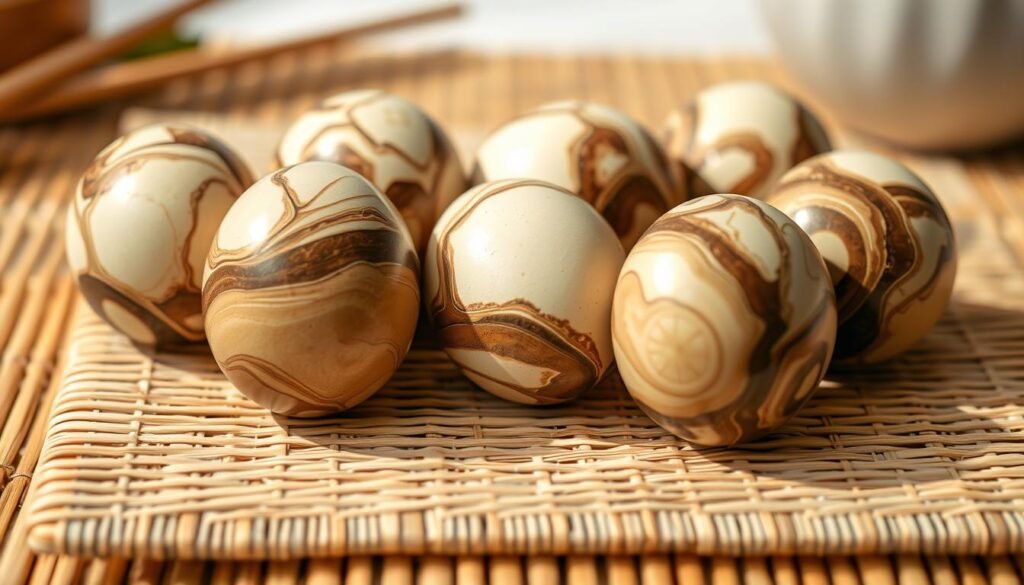
With practice and patience, you can make stunning marbled eggs. They’re perfect for impressing guests or adding flair to a classic boiled eggs recipe.
Common Problems and Solutions
When making chinese tea eggs, you might face some common issues. These can include overcooking or under-steeping, which can ruin the texture and taste. To solve these problems, it’s key to follow a popular chinese tea eggs recipe. Adjust the cooking time based on what you like.
Here are some tips to help you troubleshoot common problems:
- Adjust the steeping time to achieve the desired flavor and color.
- Use chinese tea eggs cooking tips to ensure the eggs are cooked to the right texture.
- Experiment with different types of tea to find the one that works best for you.
By following these tips and being mindful of potential problems, you’ll make delicious chinese tea eggs. These will surely impress everyone. For more cooking and recipe ideas, check out jugosnaturales.net.
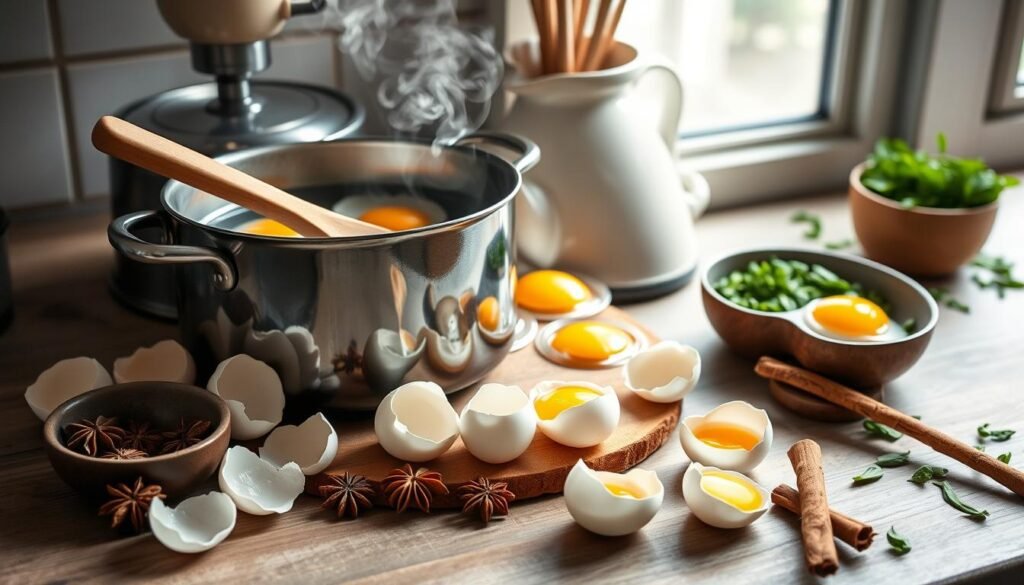
Regional Variations of Tea Eggs
Exploring tea eggs reveals unique preparations across regions. From China’s north to its south, and beyond, each place has its own twist. You’ll find a variety of Asian eggs, each with its own flavor and scent.
In Northern China, tea eggs have a strong tea taste. Southern China’s eggs are more delicate. Modern recipes have introduced new flavors, like spicy or sweet tea eggs. Whether you prefer traditional or innovative, there’s a tea egg for you.
Some popular regional variations include:
- Northern Chinese style: known for its strong tea flavor and firm texture
- Southern Chinese adaptations: characterized by a more delicate flavor and softer texture
- Modern interpretations: featuring unique flavor combinations and ingredients
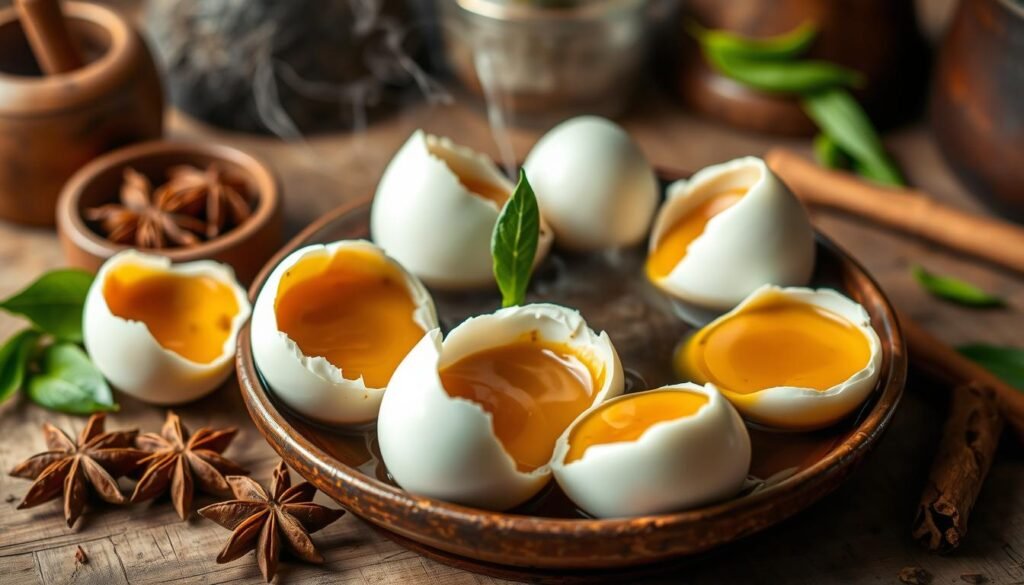
Trying these variations, you’ll see each has its own charm. The secret to great tea eggs is to experiment with ingredients and techniques. With practice and patience, you can make your own delicious, fragrant eggs at home.
Storage and Shelf Life
After making Chinese tea eggs, it’s key to store them right. This keeps them fresh and safe. You can keep them in the fridge to make them last longer.
To store your Chinese tea eggs, put them in an airtight container in the fridge. This stops moisture and other bad stuff from getting in. Also, keep them away from foods with strong smells. Eggs can pick up smells easily.
Here are some tips for storing your Chinese tea eggs:
- Store them in an airtight container to prevent moisture and contaminants
- Keep them in the refrigerator to maintain a consistent temperature
- Keep them away from strong-smelling foods to prevent odor absorption
By following these tips, your Chinese tea eggs will stay fresh longer. For more on food storage and safety, check out food safety websites. Always check the eggs for any signs of spoilage before consuming them.
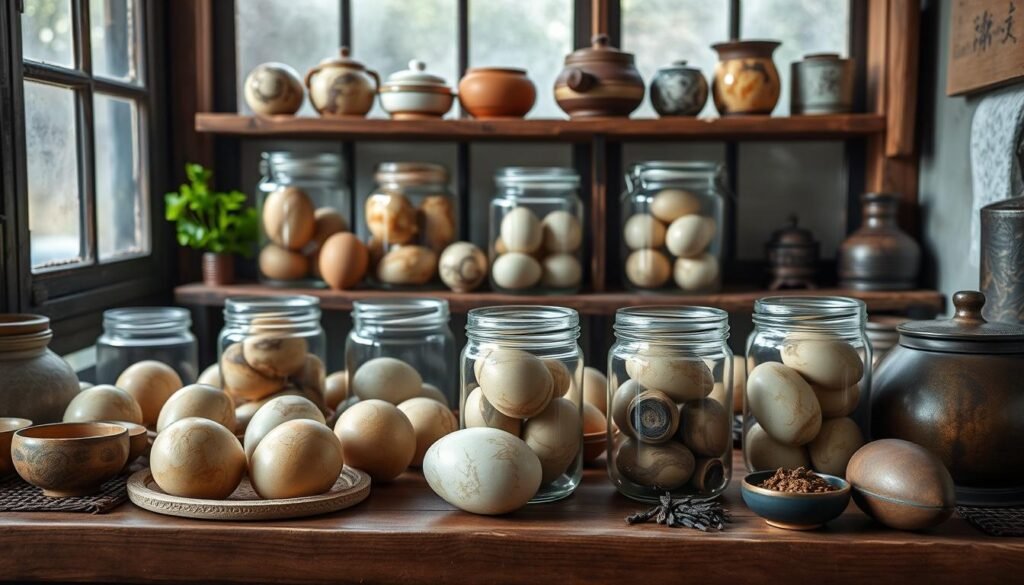
With the right storage and handling, you can enjoy your Chinese tea eggs for a longer time. They’ll stay fresh and safe. By using the Chinese tea eggs method and the right ingredients, you can make delicious and safe tea eggs anytime.
Serving Suggestions and Pairings
Enjoying homemade chinese food, like aromatic tea eggs, is a treat. You can snack on them alone or pair them with rice, noodles, or veggies. For a true taste of chinese food, serve them with hot rice or noodles.
For more ideas, check out christieathome.com. They have a simple recipe for chinese tea eggs and lots of serving suggestions. Some favorites include:
- Serving them as a side dish for a chinese-themed dinner party
- Adding them to a salad for a protein-packed meal
- Using them as a topping for a bowl of noodle soup
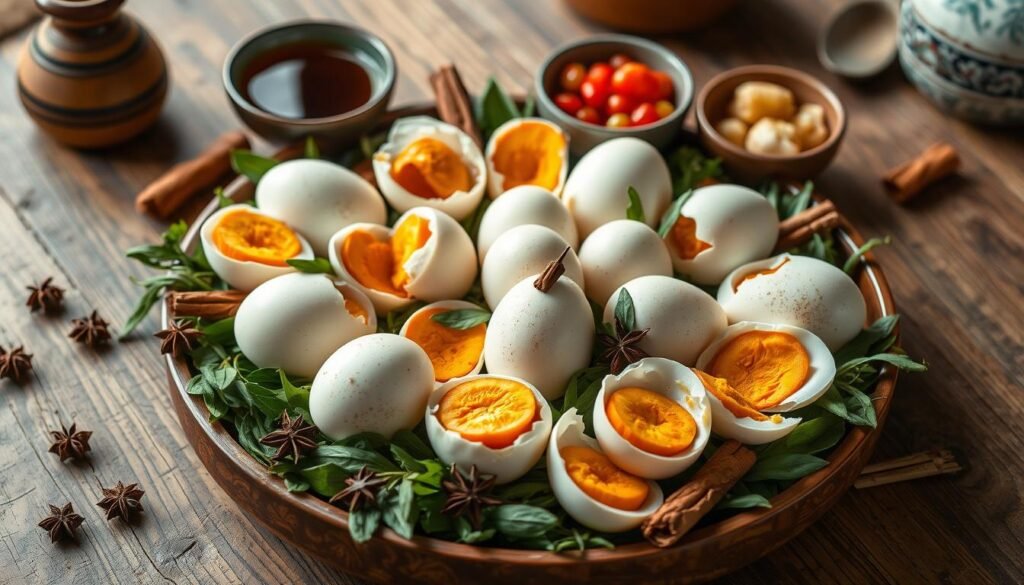
Traditional Accompaniments
In traditional chinese cuisine, tea eggs are paired with other dishes. Popular choices are pickled vegetables and steamed dumplings.
Modern Serving Ideas
Today, you can serve tea eggs in many ways. Try them with soy sauce or chili sauce. Or, use them as a topping for a chinese-inspired burger.
Conclusion: Mastering Your Chinese Tea Egg Creation
Congratulations, you’ve mastered the art of making delicious homemade Chinese tea eggs! You now know how to make these traditional marinated eggs at home. Remember, making them perfectly takes practice. So, don’t worry if your first batch isn’t perfect.
Every time you make Chinese tea eggs, you’ll learn more. You’ll also find your own special way to make them. Enjoy the process, try new flavors and techniques, and relish the tasty results. Happy cooking!


